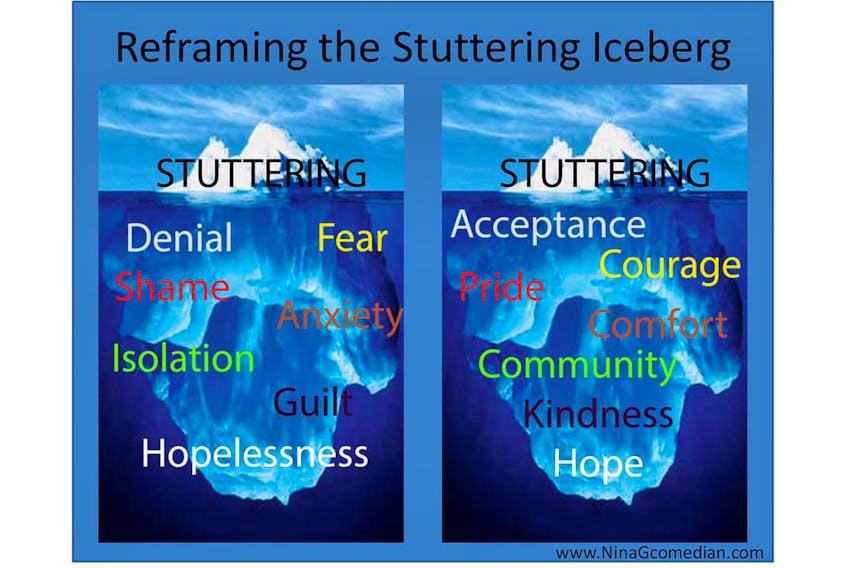ST. JOHN'S, N.L. — In Allison O’Brien’s junior year of high school, she says she felt as if every door had been slammed in her face.
Today, she is a board member of an association that is preparing to kick those barriers down.

In 1998, O’Brien submitted a story to The Telegram titled “Special without wanting to be that way: My speech impediment has made life at school — and beyond — a daily challenge.”
“It was before I had retreated and it was my last opportunity to make the world listen,” O’Brien said. “And after that, when nothing changed, I just gave up hope.”
The letter addresses her childhood struggles with a stutter — a stutter that left her with debilitating shyness and worries about her future employment.
“It scares me to think that, no matter how smart I am, I could end up in a dead-end job, or even unemployed because of the way I talk,” O’Brien wrote in her letter.
Far from where she envisioned, O’Brien is now a Child and Youth Care worker and founding member of the Newfoundland and Labrador Stuttering Association (NLSA) — a non-profit organization formed in 2018.
The NLSA plans to start the conversation around stuttering, bringing education about stuttering to schools, employers, and to the streets with Newfoundland and Labrador’s 1K/5K Walk and Run for Stuttering Awareness.
O’Brien had just given birth to her son, Levi, when she heard about the NLSA and second guessed whether the responsibilities of getting involved would be too much.

“But I looked at my son, I looked into his eyes, and I knew that I had to be a part of it because in the event that he ends up with a stutter — he deserves to live in a province, and in a world, that is more understanding, more patient and more kind,” O’Brien said.
O’Brien has felt discrimination for having a stutter ever since she could speak.
She has been passed up for jobs and promotions, and been asked if she’s hungover or stupid because of her speech.
She isn’t the only one who has felt discrimination.
The chair of the NLSA is a Gander-born Greg O’Grady. He is a person who stutters and a retired senior manager of the City of Toronto’s Long-Term Care Homes and Services Division.
He founded the A Million Things I Need to Say 1K/5K Walk and Run for Stuttering Awareness in Toronto as a way to pay it forward after receiving support for his severe stutter from the Speech and Stuttering Institute.
Despite his long career as a manager, O’Grady faced troubles with his stutter.
He had to apply for his social work program three times because he said they wouldn’t allow him in with his stutter. During his stint at trying his hand as a priest, they almost sent him back to Newfoundland because of it.
Both O’Grady and O’Brien have their sights set on lifting the weight put upon job interviews.
“One of our hopes is to reduce the amount of emphasis that is on interview scores and have it more about your experience and education,” O’Brien said. “Because that hour-long interview can determine your whole life.”
They also plan to work with speech-language pathologists to enhance their work with a focus on the emotional side of stuttering, rather than the physical.

“You see this is the key for treatment now. A lot of speech pathologists realize that they are able to treat the physical components with therapy — like facial grimaces, the breathing, stuff like that,” O’Grady said. “But there is a definite deficit in treating the emotional component and a lot of the people who stutter feel shame, embarrassment, guilt, depression and isolation.”
Jon Garcin is a speech-language pathologist for the Newfoundland and Labrador English School District, member of the board of the NLSA as a consultant. He spends his day helping school-aged children who have speech impediments.
He is also a person who stutters and agrees that the focus should be shifted.
“One thing that we should be doing more of … is looking at the negative emotions, anxiety and psychological issues that are associated with stuttering,” Garcin said.
The association provides support, friendship, and information to the stuttering community.
They also work on instilling a sense of self-worth, which is often missing in the lives of people who stutter.
“For many years I didn’t have my own identity but now I do,” O’Brien said. “I am Allison. I’m a mom. I’m a woman. I am a member of the NLSA, and it’s really nice to find my place after all these years.”
Twitter: @JasmineBurtNL
RELATED









